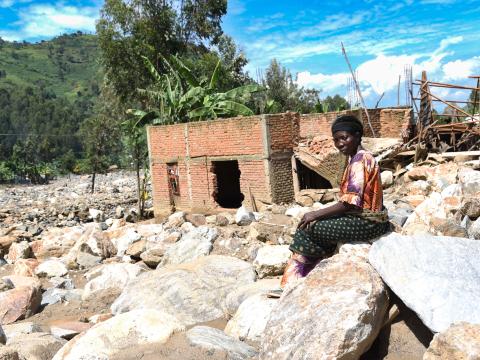World Vision warns of deadly impact of climate change in DR Congo as hundreds of pupils still missing following flood disaster

Goma - May 29, 2023
- Village school in eastern R Congo doesn’t know where hundreds of its pupils are, fearing many have been buried in mud or swept away
- Floods and landslides have killed 443, left 5,000 people missing and destroyed homes and farmland
- Aid is getting through but funding needs to be scaled up to help people who have lost everything
- Climate change will have devastating consequences in DR Congo if more isn’t done to help
The villagers of Bushushu in eastern DR Congo wonder where all the children have gone following huge flash-floods and landslides earlier this month. With hundreds still missing, thousands of people made homeless and crops and farmland washed away aid is needed on a massive scale.
In one school – Mabula Primary School – head teacher Amos Masumbuko, 39, takes the daily attendance roll and hopes more are on it than yesterday. There used to be 773 pupils. Now there are only 304. He fears hundreds were killed, but wonders whether children might also have left the villages, which were devastated by the torrential rains of 2 – 5 May. Homes were buried, ripped apart and swept away when the landslide and mud tore through the area.
The school is one of 35 where World Vision trains teachers in contemporary ways of teaching children how to read and write, provides school kits to children, as well as provides teaching and learning materials.
No one knows the death toll, which currently stands at 443, but it could be in the thousands, as so many people remain unaccounted for. The devastation was the result of very heavy rains, and resulting flash floods down steep deforested hillsides on which sat homes and farmland. Climate change will only increase the threat of this type of disaster on DR Congo, which is according to Unicef one of the places where children are most at risk to climate change. [1]
In DR Congo (pop 96 million), more than 26 million people, including 14 million children already need humanitarian assistance. Over the past six months, huge areas in Kalehe, Kasai, Kinshasa, Tanganyika and Ubangi have been hit by multiple extreme rain-related events. These have claimed lives, destroyed homes, and washed away large areas of farmland, leaving people destitute.
DR Congo faces a complex humanitarian context. Conflict, systemic inequality, disease and underdevelopment mean that the country ranks 179th out of 191 countries on the UN’s Human Development Index
With the scale of climate change impacts now becoming ever clearer World Vision is warning that much more needs to be done to avert ongoing crises impacting people who are already extremely vulnerable and only getting by day to day.
Aline Napon, World Vision’s National Director in DR Congo says: “These extreme weather events are having a terrible impact on children. Girls and boys are losing their homes and sinking further into poverty and hunger. When their parents lose everything, including their crops, they are forced to pull their girls and boys out of school, marry off daughters as children, and send them out to work. The human impact is not just physical but leaves long-lasting mental health scars too''.
“The floods and landslides in Kalehe are an example of what we can expect to see multiplying across the country. DR Congo needs international funding commitments to respond not just to current disasters but to invest in ongoing development work to mitigate climate change impacts.”
World Vision volunteer and father Celestin Ciza is an example of the human toll. He is struggling to pick up the pieces: “I lost four children to the recent floods in Bushushu. I lived and worked for my children and now they are suddenly gone. I don’t even know where to begin to recover.” Celestin was one of many volunteers working on a USAID-funded project to reduce hunger.
World Vision partnered with the World Food Programme to provide high energy biscuits to survivors in Kalehe ahead of regular food distributions that started today. Water, sanitation and hygiene kits, soap and water purifiers are also being distributed.
To address the long-term effects of climate change, World Vision is investing in climate-smart agriculture, and driving local dialogue to do more to protect people living in high-risk areas. World Vision is also calling on donors and the DR Congo government to redouble efforts to fund current and avert future crises.
ENDS
Notes
Photos of the head-teacher and the World Vision volunteer cited in the release are available on request.
SPOKESPEOPLE AVAILABLE
National Director: Aline Napon -Aline_Napon@wvi.org
SHR Director: Patrick Saah – Patrick_Saah@wvi.org
East Zone Director: David Munkley – David_Munkley@wvi.org
World Vision is a Christian humanitarian organisation dedicated to working with children, families and their communities to reach their full potential by tackling the root causes of poverty and injustice. World Vision serves all people, regardless of religion, race, ethnicity or gender. For more information, please visit www.wvi.org or follow us on Twitter and LinkedIn
[1] Children in DRC at ‘extremely high risk’ of the impacts of the climate crisis (unicef.org)